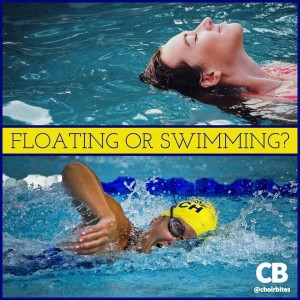Floating or Swimming?
Brody McDonald, via Choir Bites
More articles from Choir Bites can be found on their Facebook page!

I was recently working with my top choir about developing habits aimed at increasing technique and literacy, rather than “learning their songs.” You know, the “you can do better” speech.
A student came to me after class and said, “You know, Mr. McDonald, it just hit me. I thought I was working hard, but I realize now… I’ve been learning how to float instead of learning how to swim.”
I had not heard that metaphor before, so I asked him to elaborate. “I didn’t start choir until sophomore year, so I was so focused on learning how to survive that I failed to really focus on my technique. I’ve just been worried about not being wrong, so I’ve been working to blend in. Sure, I’m not sticking out negatively, but I feel like I’m not growing, either.”
We all have students who are learning to float rather than learning to swim. They are trying to “survive” by doing just enough to avoid negative attention. There is a big difference between not doing anything wrong, and doing something right. The absence of a negative is not a positive, but starting point for positive behavior to begin.
We’ve all heard the phrase “sink or swim,” but that is a false binary. There’s something between the two that is neither failure or progress, and that is FLOATING.
With any choir activity or singing technique, imagine grading the performance by placing it into one of three columns: SINK, FLOAT, or SWIM.
SINK: poor, negligent, or disruptive behaviors
FLOAT: doing “OK” or getting by – nothing wrong, but not working towards developing skill or technique
SWIM: actively engaged, working towards development of consistent skill/technique (mistakes here are A-OK!)
Because the saying is “sink or swim,” is it possible that some students mistake floating for swimming? When they can understand SINK, FLOAT, or SWIM, they can be made aware of more levels of engagement, and thus understand that just because you are asking MORE of them, doesn’t mean they were “doing it wrong.” They could do it more actively and BETTER. And remember: swimming can tire a person out. Everyone needs to float occasionally to catch their breath.
